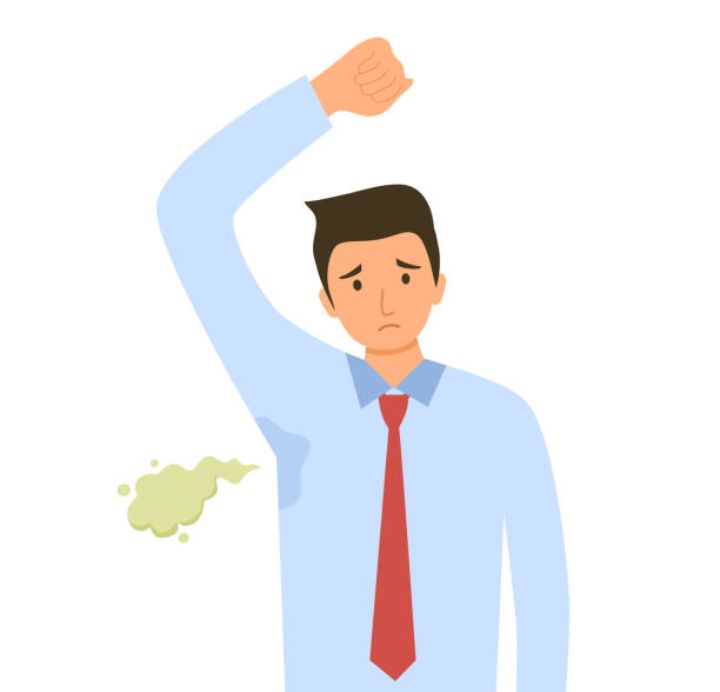Body Odour: Winning the Stinking War

The weather is humid, the temperature almost unbearable, and the poorly ventilated room already filled to the brim with students waiting to receive lectures. Some flit around the room starting conversations, while others are glued to their phones, annoyed that the lecturer is late again. One student tries not to scrunch up his face as he shifts uncomfortably in his seat, willing away the noise and heat and one other unmentionable thing.
Contrary to the opinion that sweat itself causes body odor; human sweat is almost odorless. Body odour, also known as bromhidrosis, is the smell that is perceived when the bacteria on your skin comes in contact with your sweat. Essentially, the bacteria on the skin breaks down protein molecules within sweat producing odour as a result. The type of bacteria and how it interacts with sweat determines the odour, which can be sweet, sour, or tangy. For example, armpits of men tend to have more Corynebacterium jeikeium bacteria, which can cause a rancid or cheese-like smell, while women’s armpits tend to have more Staphylococcus haemolyticus bacteria, which can cause a fruitier or onion-like smell.
What Causes Body Odour?
Now, you might be wondering why some people seem to have stronger body odour than others, and if your body odour is noticeable. There are a number of things that precipitate body odour. The human skin has two main types of sweat gland, the eccrine and the apocrine sweat glands.
Eccrine glands are active from birth and occur over most of the body, with the highest density on palms, soles and forehead. They produce clear, watery sweat directly onto the surface of the skin and help regulate body temperature.
Apocrine glands become active during puberty and are influenced by hormones. This explains why teenagers often have strong body odour. The apocrine glands are mainly located in the armpit and groin area and produce a thicker, milky sweat that is high in protein and lipids. It is the sweat from these glands that bacteria on the skin break down, producing odoriferous compounds such as fatty acids and ammonia that give off a typically unpleasant smell, and dampness on the skin giving a yellowish or greenish stain on clothing.

While it can sometimes be a pointer to an underlying disease (e.g fruity smell in diabetic ketoacidosis), most cases of body odour are not associated with disease. Some factors that can affect body odor which include:
- Stress: Both physical and emotional stress can increase sweating and worsen body odour.
- Hormones: Hormonal fluctuations during puberty, menopause, or pregnancy can lead to changes in sweat composition and body odour.
- Pheromones: Interestingly, there is an association between body odour and sexual appeal. Pheromones are chemicals emitted by the body that cause either attraction or repulsion. The olfactory membrane of the nose can pick up the pheromones in body odour.
- Diet: Certain foods like garlic, onion and spicy dishes can make sweat smell worse.
- Poor hygiene: Infrequent cleaning of the skin can lead to a buildup of bacteria and sweat, worsening body odour.
Some people are more prone to body odour than others. This could be due to genetics or hygiene habits. Medical conditions such as hyperhidrosis (excessive sweating), diabetes, kidney disease, hyperthyroidism, and skin conditions (like eczema and psoriasis) can also predispose to body odour.
It can be difficult to know if you have body odour that is discomforting to others. Ideally, you should take all steps to prevent a strong body odour. Most people would not mention it, so as not to embarrass you, but if you are still not sure, you can try to smell your armpits, groin, or feet. Alternatively, sniffing your worn clothes at the end of a long day can give you an idea of how much body odour you’re giving off.
Winning the Stinking War
So, how can this embarrassing monster be dealt with? Fortunately, there are ways to reduce or manage body odour. Some of them are:
1. Practise good hygiene: Shower or bathe at least once a day, or more frequently if you need to. An antibacterial soap or body wash can play a huge role in tackling the bacteria that produce body odour.
2. Use antiperspirants and/or deodorants: Deodorants mask or neutralize odour, but do not affect sweat production. Antiperspirants on the other hand, reduce sweat production, but many not address body odor directly. A combination of both is the best bet to beating body odour. Imported name brands may be expensive, but there are still many affordable options. Look for products that contain aluminium salts, tea tree oil, or baking soda as they inhibit bacterial growth and block sweat glands temporarily whilst reducing sweat production.
3. Wear breathable clothing: Natural fabrics like cotton or linen absorb sweat instead of leaving it on the skin for bacteria to act on. Especially for underwear, avoid synthetic fabrics like polyester or nylon.
4. Shave more often: Pubic and armpit hair can trap a tremendous amount of bacteria. Since this is also the location of the apocrine glands, bacteria would have a field day uninhibited. Try to shave armpit and groin hair from time to time to prevent this.
5. Avoid strong smelling foods: Some foods such as onions, garlic, cabbage etc can worsen body odour. If you must eat them, pay extra attention to hygiene.

It is completely natural to experience body odour, so there is no cause for alarm if you find out that you have it. You should however consider seeing a doctor if any of these happens or persists:
- Excessive sweating that interferes with daily life
- Body odour that persists despite good hygiene and deodorant and antiperspirant use
- Skin irritation or rash associated with sweating
- Fever or other systemic symptoms accompanying sweating
- A fruity body odour, which could be a sign of diabetes; or a bleach-like body odor, which could signify liver or kidney disease.
Don’t forget that body odour is a natural process, even though it can be both embarrassing and uncomfortable. By practising good hygiene and keeping the right habits, you can reduce its impact and feel fresher and more confident. Keep winning the stinking war!
Tolulope Aladeolu



